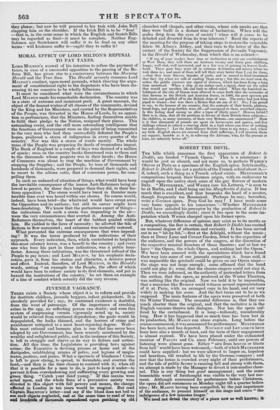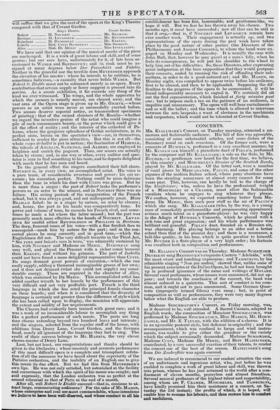ROBERT THE DEVIL.
THE bills which announce the first appearance of Robert le Diable, are headed " French Opera." This is a misnomer : it would be just as absurd, and not more so, to perform WEBER'S Oberon at Paris as a specimen of the English opera. Intrinsically, Robert le Diable has not a particle of the French school about it,— if, indeed, such a thing as a French school exists. MEYERBEER'S compositions bespeak their German origin, with an endeavour to engraft upon the native stock some of the gay flowers of modern Italy. " MEYERBEER," said WEBER (see his Letters), "is soon to be at Berlin, and I shall bring out his Margherita &Anjou. It has much that is excellent, and that bespeaks the hand of a master, though frequently too Rossinized. Perhaps he may, hereafter, write a German opera. Pray God he may I have made some very home appeals to his 'conscience."—Whether MEYERBEER. would have satisfied his preceptor by the production of Robert is Diable, we exceedingly doubt; since it lies open to the same im- putation which WEBER charged upon his former opera.
But, whatever difference of opinion may exist as to its merits as a composition, the fact is certain, that Robert is Diable has excited an unusual degree of attention and curiosity. It has been served out to us " bit-by-bit,"—first at the Adelphi, without the music ; then at Drury Lane and Covent Garden, fitted to the capacities of the audience, and the powers of the singers, at the discretion of the respective musical directors of those theatres; and at last we have" the Opera, the whole Opera, and nothing but the Opera." We have been amused with the speculations which have found their way into some of our journals respecting it. Some said, it was impossible the spectacle could be given on our Opera stage— the stage was not large enough ; some affirmed that the band could not play it; some, that the chorus-singers could not sing it. Then we were informed, on the authority of pretended letters from the author, that the opera, as produced at the Winter Theatres, was nothing like the original. Now we held it to be impossible, that a musician like BISHOP could witness several representations of it at Paris, with an arranged copy in his hand, and err very widely in making his score. And the fact turns out to be as we supposed. The main features of the opera were preserved at both the Winter Theatres. The essential difference is, that they are much shorter than the original, and that the recitative is in the English versions thrown into dialogue. Nor has the opera suf- fered by the curtailment. It is long—tediously, unendurably long. How it has happened that so much time has been lost in its production, Mr. MASON can alone explain. Long before the season commenced, it was announced for performance. MEYERBEER has been here, and has departed. NOURRIT and LEVASSE UR have been here also a month at least, and the term of their engagement is almost expired. We have been placed under the exhausted receiver of PACINI and. Co. since February, until our powers of listening were almost gone. Either "airs from heaven or blasts from hell" would have been welcomed,—both of which MEYERBEER could have supplied: but we were allowed to linger on, hopeless and heartless, till recalled to life by the German company ; and now that the house is crowded every night of their performance, and the tide of public favour is running full and strong with them, an attempt is made by the Manager to divert it into another chan- nel. This is any thing but good management; and the same lamentable want of forethought was visible to the very last mo- ment. Although announced for performance before Christmas, the opera did not commence on Monday night till a quarter before nine ; Mr. MASON having been compelled, by the just impatience of the audience, to present himself on the stage and crave "the indulgence of a few minutes longer." We need not detail the story of a piece now so wellknown; it will suffice that we give the cast of the opera at the King's Theatre compared with that of Covent Garden.
King's Theatre. Covent Garden.
Robert M. NOURRIT Mr. BRAHAM. Bertram 31. LEVASSEUIL Mr. REYNOLDSON.
Raimbaut M. DA310REAU Mr. KEELEY.
Isabella Mad. CINTI DA310REAU Miss SIIIREFT.
Alice Mad. DE MERIC MISS INVERAILITY.
We have said that our opinion of the musical merits of the piece are unchanged. It is a work of great labour and skill, and of some genius; but our ears have, unfortunately for it, of late been ac- customed to WEBER and BEETHOVEN; and its rank must be as- signed at many degrees below Der Freischiitz and Fidelio. Neither in the graceful nor the terrible does MEYERBEER approach the elevation of his master : where he intends to be sublime, he is sometimes ludicrous,—a casualty that never befals WEBER. But .Robert lc Diable must not be estimated merely as an opera. Every contribution that art can supply or fancy suggest is pressed into its service. As a scenic exhibition, it far exceeds any thing of the kind we ever witnessed. The wings, and the whole apparatus by which the scenery is usually moved, are cleared away, and the vast area of the Opera stage is given up to Mr. GRIEVE,—whose powers as an artist were never so successfully exerted before. Two scenes deserve especial notice, as transcendent specimens of painting : that of the ruined cloisters of St. Rosalie—whether we regard the inventive genius of the artist who could imagine a pile of such consummate beauty, or the power which could give it all the effect of reality ; and the interior of the cathedral of Pa- lermo, where the gorgeous splendour of Gothic architecture, in its perfect state, bursts on the spectator's view—are, in themselves, sufficient to render the piece attractive. But this is not all—the whole coips de ballet is put in motion; the fascination of IlEasaLs, the talents of ANCELIN, SAMENGO, and ALBERT, are employed to heighten and enrich the pageant. Thus, our senses are actually taken by storm ; and, in one way or other, every auditor and spec- tator is sure to find something to his taste, and he departs delighted with much that he has seen and heard.
To the general effect the singers contributed their full share. NouartiT is, in every view, an accomplished artist. His voice is a pure tenor, of considerable sweetness and power; his ear ac- curate ; his execution perfect. Nothing could be more delicious than the tune in which his duet with CINTI was given. But he is more than a singer : the part of Robert tasks the performer's powers as an actor to the utmost, and in NOURRIT there was no failure. His acting partook of the exaggeration of the French school, but it was always good, and not unfrequently great. Here BRAHAM failed: he is a singer by nature, an actor by chance; and, hence, the part in his hands was comparatively tame. In power and volume of tone, he exceeds his French rival, and some- times he made a hit where the latter missed ; but the part was generally much more effective in the hands of NOURR1T. LEVAS- SEUR far outdid either EEYNOLDSON or PHILLIPS in Bertram. The deep, funereal tones of his voice—with a fine fiendish face to correspond—mark him by nature for the part ; and in the con- certed pieces he sang correctly and in good tune,—which the Englishmen did not. The very difficult terzetto in the Third Act, " Ses yeux sont baissils vers la terre," was admirably sustained by him, with NOURRIT and Madame DE MERIC. DAMOREA.0 sang very well, and played the Peasant with a richer comic humour than KEELEY, and without his grimace. The part of Isabella could not have found a more delightful representative than CINTI.
Its songs demand great powers of execution,—which she can easily supply, adding a thousand unimaginable graces of her own; and it does not demand (what she could not supply) any consi- derable energy. These are required in the character of Alice, which was sustained by DE MERIC. This accomplished artist has added another wreath to her laurels by the performance of this very difficult and not very profitable part. French is the third language in which she has acted the principal female character on these boards; and when it is considered that the diversity of language is certainly not greater than the difference of style which she has been called upon to display, the musician will appreciate the extent and solidity of her acquirements. The Chorus had evidently been trained with great care; and it was a work of no inconsiderable labour to accomplish any thing like a perfect performance of such music. The parts are long (one chorus extending beyond two hundred bars) and intricate ; and the singers, selected from the regular staff of the house, with additions from Drury Lane, Covent Garden, and the German band, nearly all ignorant of the language they had to sing. The credit of their success belongs to Mr. HARRIS, the very clever chorus-muter of Drury Lane. .Last, but not least, our congratulations and thanks should be given. to the Orchestra ; whose masterly and accurate performance of this most difficult opera is a complete and triumphant refuta- tion.of all the nonsense we have heard about the superiority of the Parisian orchestras, and the inability of an English one to give this music its due effect. But we had this from MEYERBEER'S own lips. He was net only satisfied, but astonished at the facility and correctness with which the spirit of his music was caught; and said expressly, that the London orchestra was as perfect at the second rehearsal as that of Paris at the end of a month.
After all, will Robert .le Diable succeed—that is, continue to at- tract large, remunerating:aadences? For the sake of Mr. MASON, whose enterprise and zeal are avast commendable, whose intentions sve .b_elieve to have been welkliteeted, and whose conduct to all his establishment has been fair, honourable, and gentleman-like, we hope it will. But we fear he has thrown away his chance. Two months ago, it must have succeeded ; now all that can be said is that it may,—that is, if NOURRIT and LEVASSEUR remain here over another week. Their engagement is actually up, and two representations of the opera during the past week have taken place by the good nature of other parties (the Directors of the Philharmonic and Ancient Concerts), to whom the band were en- gaged on Monday and Wednesday. It is usually the case with John Bull, that, however he may growl at a man's folly, when he feels its consequences, he will put his shoulder to the wheel to help him out of his difficulties. So, these Directors, after expressing great indignation at the bare supposition that they would postpone their concerts, ended by running the risk of offending their sub- scribers, in order to do a good-natured act; and Mr. MASON, on Monday night, was compelled to appear twice before his audience, first to be abused, and then to be applauded. Supposing the dif- ficulties to the progress of the opera to be surmounted, it will be found indispensably necessary to curtail it. We certainly did sit out the first representation, which finished at forty minutes past one; but to impose such a tax on the patience of an audience, is impolitic and unnecessary. The opera will well bear curtailment— and so will the ballet; and the time which is allowed to intervene between the acts bespeaks a want of alertness in the machinists and carpenters, which would not be tolerated at Covent Garden.




























 Previous page
Previous page